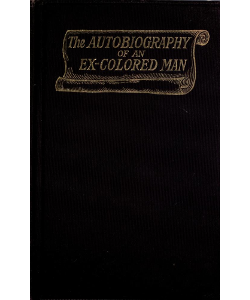The Autobiography of an Ex-Colored Man

Author:
James Weldon Johnson
Publication:
1912 by Sierra Club Books
Genre:
Adult Fiction, Autobiographical Novel, Classic Literature, Fiction
Pages:
207
Current state:
Basic information has been added for this book.
It is under consideration and will be updated when it is evaluated further.
Book Guide
Search for this book used on:
Originally published in 1912, this novel was one of the first to present a frank picture of being black in America.
Masked in the tradition of the literary confession practiced by such writers as St. Augustine and Rousseau, this "autobiography" purports to be a candid account of its narrator's private views and feelings as well as an acknowledgement of the central secret of his life: that though he lives as a white man, he is, by heritage and experience, an African-American.
Written by the first black executive secretary of the NAACP, The Autobiography of an Ex-Colored Man, in its depiction of turn-of-the-century New York, anticipates the social realism of the Harlem Renaissance writers. In its unprecedented analysis of the social causes of a black man's denial of the best within himself, it is perhaps James Weldon Johnson's greatest service to his race. From the Penguin Classics edition
One of the most prominent African-Americans of his time, James Weldon Johnson (1871–1938) was a successful lawyer, educator, social reformer, songwriter, and critic. But it was as a poet and novelist that he achieved lasting fame.
Among his most famous works, The Autobiography of an Ex-Colored Man in many ways parallels Johnson's own remarkable life. First published in 1912, the novel relates, through an anonymous narrator, events in the life of an American of mixed ethnicity whose exceptional abilities and ambiguous appearance allow him unusual social mobility — from the rural South to the urban North and eventually to Europe.
A radical departure from earlier books by black authors, this pioneering work not only probes the psychological aspects of "passing for white" but also examines the American caste and class system. The human drama is powerful and revealing — from the narrator's persistent battles with personal demons to his firsthand observations of a Southern lynching and the mingling of races in New York's bohemian atmosphere at the turn of the century.
Revolutionary for its time, the Autobiography remains both an unrivaled example of black expression and a major contribution to American literature.
From the Dover Thrift Edition
To view an example page please sign in.
Content Guide
Please sign in to access all of the topics associated with this book and view other books with the same topics.
Please sign in to access the locations this book takes place in and view other books in the same location.
Please sign in to access the time periods this book takes place in and view other books in the same time period.
For information about the lead characters please sign in.
Please sign in to access information about the content of this book that you may want to consider before reading.
Find This Book
Search for this book used on:


